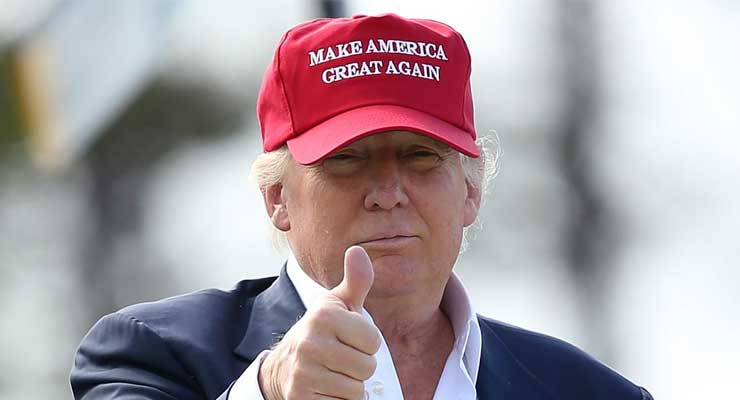
The Frustration Fueling Trump’s Support
A phenomenon spun by policy and emotion alike has been encompassing conservatives across the nation in passion against the status quo. Though led by the same desire for distinct change in the leadership of the United States that had managed to get President Barack Obama elected in 2008, it is distinct in that it is a hostile response to Obama’s liberal agenda more than anything else.
But there is another key player to the political climate at works here that, though recognized, is remarkably underrated: the establishment lane of Republicans, and its response as a collective unit to the current Obama Administration. In fact, Republican governmental officials working in Washington D.C. and throughout the nation have been the target of poignant criticism by rightists just as much as Obama has. According to supporters of the Republican Party, those in charge now and in the past, from former governors to sitting senators, are to blame for the nation’s progressive direction. The Republican base feels they have been betrayed by constantly electing Republican politicians who spew promises, but ultimately fail to truly champion for the conservative cause.
This perceived failure of the Republican Party to deliver on its promises is essentially the force behind Donald Trump’s recent surge in the polls. Although Trump has been candid on the subject of his political views for decades, his popularity in the world of politics is recent and reflects the bewildering circumstances of this current election cycle. The political atmosphere of frustration among Republican voters today simply feeds into the rise of Trump, an outspoken and valiant Queens, New York business magnate immune to the stigma characterizing elected officials.
But Trump sits on a throne of lies. Stripping himself of political correctness and compassion, Trump appears blunt, almost naked, bereft of any ounce of understatement and tongue biting. His speeches and interviews suggest that he simply will not be confined to the rules of social conduct, as he fearlessly flirts with the fears of Americans using exaggerated assertions, outlandish proposals, and an over-the-top delivery. But it is this same persona that makes his candidacy so enthralling. For his supporters, it’s in the form of attraction and fondness. For just about everyone else, it’s in the form of dismay at its apparent effectiveness and ridiculousness. Regardless, Trump has managed to grab the media’s attention using his caricatured nature, and after attaining pronounced coverage, has only multiplied the support of his campaign.
The Ironic Nature of Trump’s Support
Trump’s rise is undeniably distinct, yet fascinatingly ironic as a political phenomenon. To start with, Trump is anything but a true conservative. Yes, there is an undeniable tilt to the right in his political standing on basic key issues, from aggressively believing in the demonization of a path to citizenship to his stance in favor of gun rights.
But the reality is, being a conservative means much more than just standing on the right for a few critical issues, and Trump is simply not the quintessential conservative. He is not running on behalf of his belief in the power and vitality of using the U.S. Constitution and the Bible to govern. If anything, he, as well as his message of making America great again, is a strain of an independent cause that embraces nationalism more so than any ideological divide in American politics.
The proof is in the pudding. He has supported raising taxes on the wealthy in the past, as well as having publicly condoned reproductive rights and a single-payer healthcare system, all of which are stances greatly opposed to the conservative pigeonhole his supporters are placed in.
How ironic is it, that although Trump is not a true conservative, he is in fact the legitimate representation of the conservative backlash at the failure of elected politicians to counteract Obama?
Even more ironic, there are strong parallels between Obama and Trump themselves. Both swept in with relatively little experience in politics, though Obama’s was centered on a term in the Senate, while Trump’s was merely a shallow celebrity-driven dive. Both also managed to unexpectedly capture the hearts and minds of voters, stealing traction away from the predetermined front-runners, Hillary Clinton and Jeb Bush respectively. And last but not least, both have resonated by playing on this idea of changing America for the better, while both simultaneously managing to polarize the American people.
Building on the last note, I will even venture to say that Trump is more polarizing than Obama. People either love Trump, admiring his blunt individuality, or despise him for spreading hate and stealthily feeding off of the emotional prejudices of his followers. And this line marking the split is not a simple one that can be drawn straight along the Democrat and Republican divide. In fact, it cuts within the Republican Party itself. So, given the Republican Party’s depiction of Obama as a petty, ineffective leader only capable of dividing the American people, I conclude that Trump’s support is soaked and grounded in irony.
Love or hate Trump, if elected, he will without a single ounce of doubt alter how the United States is run at home and abroad. And there is also no doubt his supporters are desperately yearning for this change. But, I must ask, is this really what Trump’s supporters have in mind? Electing a man who lacks the conservative drive? A man who will only prolong the empty promise of change as he divides the American people further? Isn’t partisan politics what primarily set them against Obama?
Or, maybe supporting Trump is just their way of channeling their anger and instilling revenge on Obama’s supporters for putting them through eight years of frustration. But that still begs an immensely important question worth considering: why would Trump’s supporters opt for more of the same divisive, non-conservative energy that had disgruntled them in the first place?
Leave a Reply